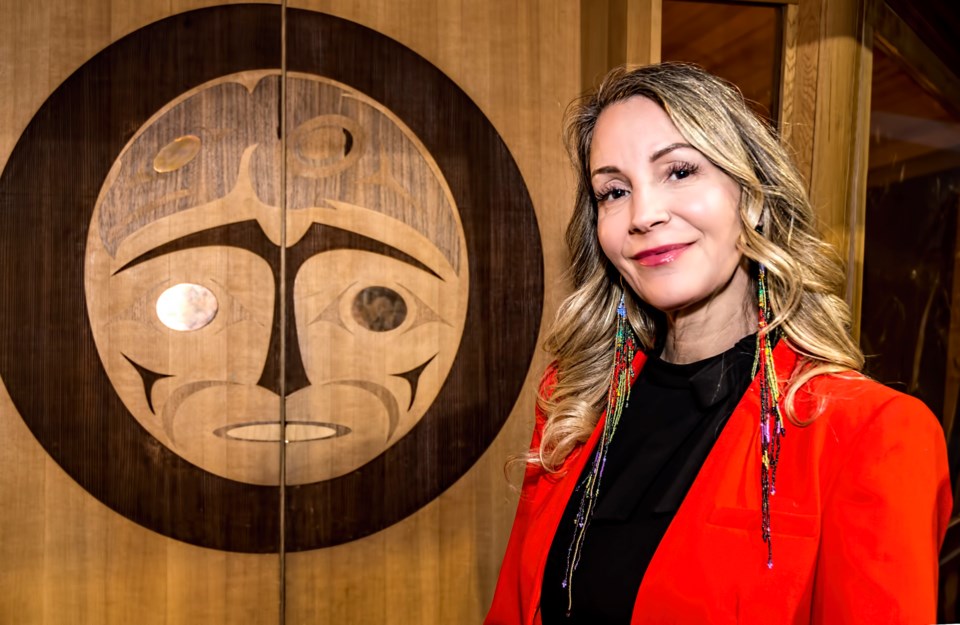Within Canada’s Indigenous business community, Geena Jackson may be best known as the creator and executive producer of Bears’ Lair—a Dragons’ Den-style reality TV series that showcases Indigenous entrepreneurs and their ventures.
But that is just one Jackson’s business initiatives, most of which are focused on helping other Indigenous entrepreneurs grow their companies.
Her main business is Indigenous Initiatives, which she runs with her husband, Dean Montgomery.
She is also vice-president of business development of Sunspear Renewables, a business partner in the renewable energy space that works with Indigenous communities on projects like rooftop solar.
A member of the Frog Clan of the shíshálh (Sechelt) Nation, Jackson obtained a degree in broadcast journalism from the BC Institute of Technology, but it would be more than two decades before she put it to use as a TV producer in 2020, which was when she pitched Bears’ Lair TV to the Aboriginal Peoples Television Network (APTN).
In the interim, she interned for the TV show Hardcopy in the late 1990s in Los Angeles, ran a hot tub business in Toronto and then returned to B.C. and spent 13 years working for the Squamish First Nation in the nation’s economic development office. There, she worked as the economic development business officer and project administrator for the Squamish Nation Trust.
While at the Squamish Nation’s economic development office, one of Jackson’s jobs was helping Squamish entrepreneurs. She’s still doing that, just on a broader scale.
One of the barriers faced by Indigenous entrepreneurs and Indigenous-led companies is access to capital. Another is capacity.
“We do capacity building for nations,” Jackson said recently at the Indigenous Partnership Success Showcase (IPSS), where she was a panellist. “And there is tons of money out there for people to assist you. You are not alone.”
Indigenous Initiatives provides a grant-writing and project-management service for Indigenous communities and businesses.
Organizations such as the National Aboriginal Capital Corporation Association provide grants and loans to Indigenous entrepreneurs. But applying for grants—and in particular, federal grants—can be an arduous task.
Indigenous Initiatives makes grant applications for Indigenous communities free of charge. If the application is successful and grant funding is provided, the applicant agrees to hire Indigenous Initiatives as their project manager.
“So you don’t have to hire an [economic development] officer,” Jackson explained. “You don’t have to hire a grant writer for $10,000 to write a grant for you and not knowing if that grant was going to get approved.”
A main area of focus for Indigenous Initiatives is project development in the renewable energy space—mostly solar power. To get Indigenous youth interested in business, Indigenous Initiatives also holds entrepreneurship camps for First Nations children aged 12 to 18, and annually holds an Indigenous youth summit.
In 2020, Jackson and her husband hatched a reality TV show idea based on Dragons’ Den, but with a focus on Indigenous entrepreneurs.
“During COVID, my husband said, ‘Why don’t we pitch this to APTN?’ So we did, and they liked it,” she told BIV.
Although APTN green-lit the show, Jackson and Montgomery were responsible for raising the capital to finance it. The first two seasons were shot in North Vancouver.
In each episode, three businesses compete for prize money with pitches to a panel of accomplished judges. Contestants must have more than just a good idea—they must have established businesses.
“You have to have a business for at least one to two years,” Jackson said. “You have to be making a profit, and you have to have some sort of transactional good or service that you’re selling.”
Jackson is one of the four core judges, or “bears,” as they are called. Other core judges are high-profile Canadian Indigenous business leaders: Dave Tuccaro, founder and president of the Alberta-based industrial service company Tuccaro Group; Tabatha Bull, president of the Canadian Council for Indigenous Business (formerly the Canadian Council for Aboriginal Business); and Clint Davis, former CEO of the Inuit-owned development company Nunasi Corporation and current CEO of the Indigenous-led advisory firm North35.
The first season of Bears’ Lair was successful enough to be renewed for a second season, the first episode of which aired June 4.
The show got an additional boost when CBC picked up season one.
“Season one is on Air Canada,” Jackson added. “It’s also on Apple TV and also internationally it’s getting sold to different markets.”



